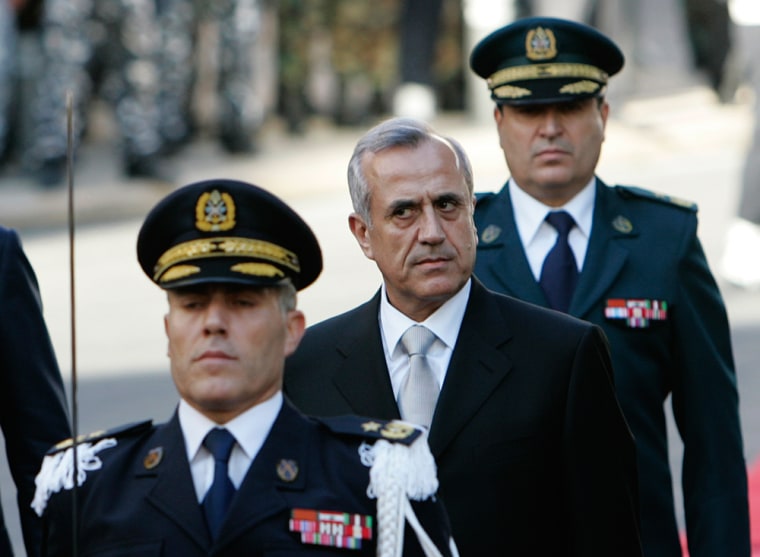Michel Suleiman was sworn in as Lebanon's president Sunday after parliament elected him in long-delayed vote following an 18-month political stalemate that brought the country to the brink of another civil war.
Celebratory gunfire and occasional explosions reverberated across the capital Beirut as news of the army commander's election was announced.
In the general's hometown of Aamchit on the Mediterranean coast north of Beirut, hundreds of people broke out in cheers and dancing in the main square as they watched the vote on a giant screen.
The Hezbollah-led opposition and Western-backed government agreed last week to elect Suleiman as part of their deal to end the political crisis. The presidential vote had been postponed 19 times since November when the last president, Emile Lahoud, left office.
Major victory for Hezbollah
The Arab-mediated deal reached in Doha, Qatar was a major victory for the Iranian-backed Hezbollah and its allies, who got their long-standing demand for veto power over all government decisions.
It was a setback for the U.S., which had strongly backed the Lebanese government for three years and is concerned that Iran's influence is spreading in the Middle East. Nevertheless, the U.S. has welcomed the political agreement in Lebanon.
"I am confident that Lebanon has chosen a leader committed to protecting its sovereignty, extending the government's authority over all of Lebanon, and upholding Lebanon's international obligations under U.N. Security Council resolutions," President Bush said in a statement.
Suleiman, a compromise candidate, ran unopposed. He won 118 votes of the 127 living members of the legislature, according to parliament speaker Nabih Berri.
There were six blank ballots. Two legislators voted for one-time presidential hopefuls and one was in the name "Rafik Hariri and the martyred legislators" — a reference to the slain former prime minister and five other lawmakers killed in bombings in the last three years.
Some objected to vote
As the session got under way, four lawmakers objected to the vote, saying the constitution must be first amended to allow a sitting army chief to run for the post. But Berri rejected their requests.
Lebanon's constitution bans serving top government officials, including army commanders, from becoming president. Parliament should have to amend the constitution but experts said this time around is an exception because the president's post is vacant.
The voting in secret ballot got under way shortly after the objections were raised. A roll call of legislators present was read aloud and each deposited a ballot in the box.
A U.S. delegation of congressmen — including Rep. Nick Rahall, D-W.Va., Rep. Darrell Issa, R-Calif., Rep. Ray Lahood, R-Ill., and Rep. Charles Melancon, D-La. — were in attendance at the vote.
Representatives from both sides of the Middle East's Sunni-Shiite divide came: the foreign ministers of Syria and Iran, which support Hezbollah, and Saudi Arabia, a strong backer of the government.
Other dignitaries on hand were French Foreign Minister Bernard Kouchner and EU Foreign Policy Chief Javier Solana.
Iranian Foreign Minister Manochehr Mottaki told reporters at the Beirut airport that he was carrying with him a "sea of support" for Lebanon.
Kouchner, in a veiled comment aimed at Hezbollah, said he had hoped the solution would come in a more "democratic" way. "But this is Lebanon," he added. Kouchner had for months tried to mediate between feuding Lebanese politicians to no avail.
Much election excitement
On the eve of the election, there was anticipation and much excitement across Lebanon.
The Lebanese flag — red and white with a cedar tree in its middle — adorned almost every street and wall in parts of the country. Slogans welcoming the president-to-be, along with his pictures, stretched across highways leading to the capital.
The Arab-mediated agreement reached Wednesday in Qatar ended a standoff that had paralyzed Lebanon's government before boiling over into the worst violence since the 1975-1990 civil war. It left at least 67 dead and 200 wounded.
The Qatar deal was a major victory for Hezbollah and its allies, who got their long-standing demand for veto power over all government decisions.
But most Lebanese just seem happy that the shadow of war has been lifted, at least for now.
Over the past two days, life has returned to Beirut's upscale downtown — a symbol of the city's rebirth after it was devastated and rebuilt after the 15-year civil war. The area had turned into a virtual ghost town by a Hezbollah-led sit-in for the past 17 months.
Life returning to Beirut
Already it appears that the economy, battered by violence and uncertainty, is on the upswing. The stock market is up and, according to tourism officials, 750,000 Lebanese expatriates have booked summer vacations in Lebanon.
"Hundreds of Arab and foreign investors are preparing to return with their money to Lebanon after they were searching for a secure place," Prime Minister Fuad Saniora said in a statement after chairing his Cabinet's last meeting Friday night.
The army general bid farewell to fellow officers Saturday, and was expected to take off this uniform in a symbolic break with the military just after he is elected president.
Suleiman's election is expected to add to political stability — he has pledged to strengthen "reconciliation and understanding" among rival factions.
"Lebanon is a country that deserves much from us. The Lebanese are a people who enjoy life. They have always proved that they are stronger than crises and pitfalls to which they have been subjected and for which they have paid blood, tears and sacrifices," An-Nahar newspaper quoted Suleiman as saying Saturday.
"We have a big challenge ahead of us."
